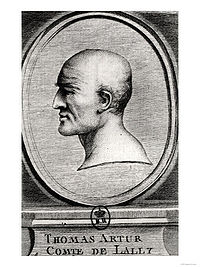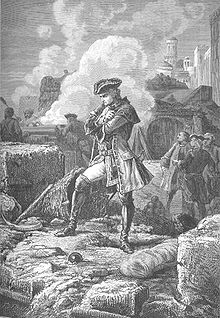- Thomas Arthur, comte de Lally
-
Thomas Arthur, comte de Lally, baron de Tollendal (January 1702 – 6 May 1766) was a French General of Irish Jacobite ancestry. He commanded French forces in India during the Seven Years War. After a failed attempt to capture Madras he lost the Battle of Wandiwash to British forces under Eyre Coote and then was forced to surrender the remaining French post at Pondicherry. After a time spent as a prisoner of war in Britain, Lally returned to France where he was executed as a punishment for his failures in India.
Contents
Life
He was born at Romans-sur-Isère, Dauphiné, the son of Sir Gerald Lally, an Irish Jacobite from Tuam, County Galway, who married a French lady of noble family, from whom the son inherited his titles.
Entering the French army in 1721 he served in the war of 1734 against Austria; he was present at Dettingen (1743), and commanded the regiment de Lally in the famous Irish brigade at Fontenoy (May 1745). He was made a brigadier on the field by Louis XV.
He had previously been mixed up in several Jacobite plots, and in 1745 accompanied Charles Edward to Scotland, serving as aide-de-camp at the battle of Falkirk (January 1746). Escaping to France, he served with Marshal Saxe in the Low Countries, and at the capture of Maastricht (1748) was made a maréchal de camp.
When war broke out with Britain in 1756 Lally was given the command of a French expedition to India. He reached Pondicherry in April 1758, and at the outset met with some trifling military success.
He was a man of courage and a capable general; but his pride and ferocity made him disliked by his officers and hated by his soldiers, while he regarded the natives as slaves, despised their assistance, and trampled on their traditions of caste. In consequence everything went wrong with him. He was unsuccessful in an attack on Tanjore, and had to retire from the Siege of Madras (1758) owing to the timely arrival of the British fleet. He was defeated by Sir Eyre Coote at the Battle of Wandiwash (1760), and besieged in Pondicherry and forced to capitulate in 1761.
Execution
Lally was sent as a prisoner of war to England. While in London, he heard that he was accused in France of treason, and insisted, against advice, on returning on parole to stand his trial. He was kept prisoner for nearly two years before the trial began; then, after many painful delays, he was sentenced to death on May 6, 1766, and three days later beheaded. Louis XV tried to throw the responsibility for what was undoubtedly a judicial murder on his ministers and the public, but his policy needed a scapegoat, and he was probably well content not to exercise his authority to save an almost friendless foreigner.
In volume one of his "French Revolution", Thomas Carlyle describes the death of Lally as a judicial murder, reporting that Lally was driven to execution gagged to prevent his crying out against the injustice, and that when Lally's son came of age, he sought to have his father's name cleared in the Parlement de Paris. The orator Despreminil acted as spokesman of Parlement and refused to consider any repentance, much to his discredit in Carlyle's opinion.
See GB Malleson, The Career of Count Lally (1865); "Z's" (the marquis de Lally-Tollendal) article in the Biographie Michaud; and Voltaire's Œuvres complètes. The legal documents are preserved in the Bibliothèque Nationale.
See also
Sources
 This article incorporates text from a publication now in the public domain: Chisholm, Hugh, ed (1911). Encyclopædia Britannica (11th ed.). Cambridge University Press.
This article incorporates text from a publication now in the public domain: Chisholm, Hugh, ed (1911). Encyclopædia Britannica (11th ed.). Cambridge University Press.Government offices Preceded by
Georges Duval de LeyritGovernor-General of French India
1758–January 16, 1761Succeeded by
First British occupation
(January 16, 1761 - June 25, 1765 )Categories:- 1702 births
- 1766 deaths
- People from Romans-sur-Isère
- French generals
- French colonial governors and administrators
- Governors of French India
- Counts of Lally-Tollendal
- French people of Irish descent
- People executed for treason against France
- People executed by decapitation
- Earls in the Jacobite peerage
- Viscounts in the Jacobite peerage
- Barons in the Jacobite peerage
- French prisoners of war
- People executed by the Ancien Régime in France
- Executed French people
Wikimedia Foundation. 2010.


